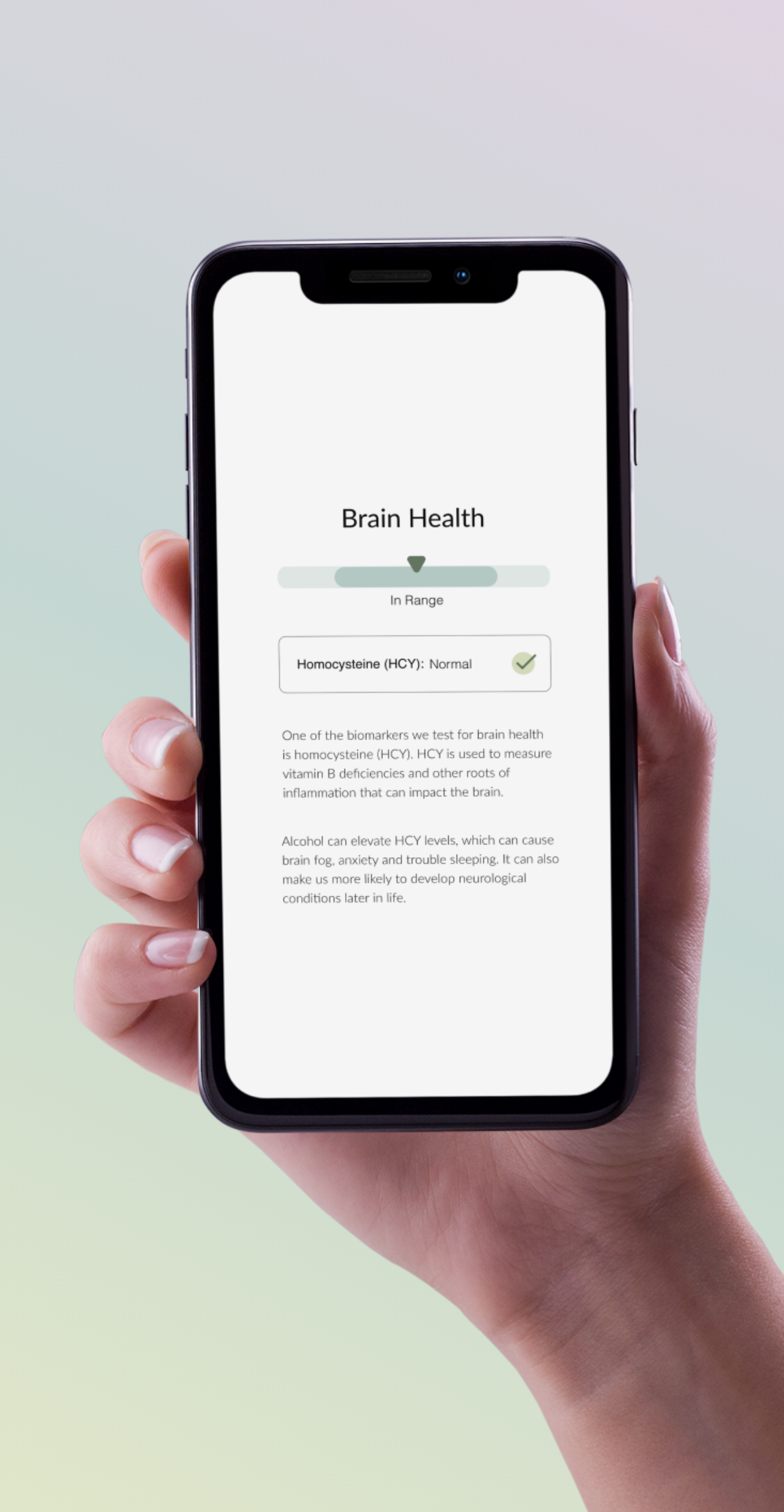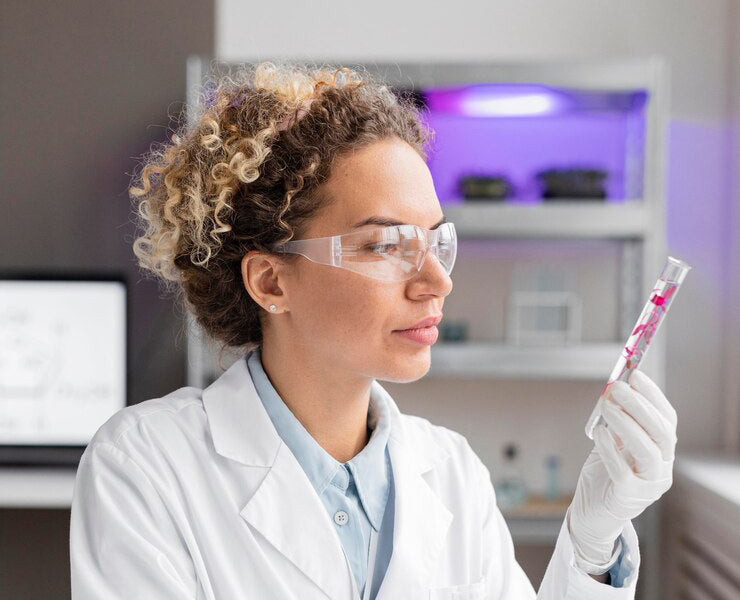Signature Alcohol Health Test
Signature Alcohol Health Test
- What it measures
- What’s included
Meet the first comprehensive test to monitor how alcohol impacts your brain health.
Measures 7 biomarkers across core health categories that are sensitive to alcohol at low and moderate levels of consumption.
Finger prick
sample collection
CLIA/CAP
accredited lab
Physician-reviewed results delivered to your Seek account
Custom care plan generated from your biomarker levels
Access to Seek’s community of women with similar drinking habits
Add-Ons
Monitor how alcohol impacts 10 additional biomarkers
*Includes deeper insight into inflammation, stress levels, sleep and sugar cravings
Monitor for early indicators of breast cancer
*Up to one drink a day can increase a woman’s risk for breast cancer
Monitor how alcohol impacts your reproductive health
*Includes a deep analysis into fertility or menopause, depending on what matters to you
Couldn't load pickup availability

Who Seek’s test is for
-

Women who drink
any amount of alcoholWhether you drink once a month, only on weekends or several times during the week
-

Women with
alcohol-related symptomsSymptoms could be anything from brain fog, to digestive issues, to skin redness or irritation
-

Women who want to
change their drinking habitsYou could be planning to run a marathon, have a baby, or prevent night sweats during menopause
What do I get with Seek’s Signature Alcohol Health Test?

1
Detailed analysis of your test results, including how your drinking habits can impact your health now and in the future
2
Custom care plan generated from your biomarker levels that’s easy to follow even if it’s your first time getting lab work
*Includes insights on specific drinks and other lifestyle factors that can impact symptoms to help you meet your goals faster
3
Actionable improvement timeline based on women with similar drinking habits and the most comprehensive research on alcohol and women’s health
4
Preventive health screening for early indicators of the top alcohol-related conditions, including heart disease and breast cancer
How It Works
-

Take a clinician-approved quiz
Personalizes your test panel based
on your drinking habits and health goals -

Order a test and collect your sample
Easy at-home testing and pre-paid
shipping to CLIA/CAP accredited lab -

Get your custom insights and care plan
Delivered privately to your Seek account, where you can track your progress over time
Exploring the science behind alcohol health testing
21 biomarkers, 300+ studies, all focused on how alcohol impacts the female body differently
Homocysteine (HCY)
An amino acid used to measure vitamin B deficiencies and other roots of inflammation. Alcohol can elevate HCY levels, which is why vitamin B9 (folate) and B12 are the two most common vitamin deficiencies brought on by drinking.
Cortisol
The body's main stress hormone that impacts everything from sleep, to mood, to focus and patience. Drinking can lead to higher cortisol levels over time, which means even if you haven't had a drink for a few days or a week, cortisol can remain elevated.
Weight gain, irritability and anxiety are all symptoms of high cortisol.
Total Cholesterol
Measures levels of cholesterol (a fatty lipid) in the blood. High cholesterol levels can act as an early warning sign for heart disease. Drinking can elevate cholesterol, especially in women with a family history.
High cholesterol can cause plaque build up in the arteries, which is what leads to heart disease and other health conditions over time.
Gamma-Glutamyl Transferase (GGT)
An enzyme and marker of how alcohol impacts the liver. GGT can help detect liver scarring over a decade before a liver-related diagnosis. Levels can elevate if a woman consumes 1+ drinks daily or 7+ drinks weekly.
Estradiol
A hormone made naturally by the ovaries that impacts most areas of women's health, including everything from sleep quality, to our menstrual cycle, to how we process stress. Drinking can elevate estradiol levels, which is why as little as one drink a day increases a woman's risk for breast cancer.
High estradiol levels is one of the earliest indicators of breast cancer.
Triglycerides
A type of fat in the blood that doesn't have nutritional value. Triglycerides is a strong indicator of heart health. Drinking can elevate triglycerides, increasing risk of heart disease and stroke. Women are at higher risk than men.
Vitamin D
A fat-soluble vitamin that helps the body absorb other nutrients, making it essential to gut microbiome health. Drinking is one of the most common causes of low vitamin D and women are more susceptible to vitamin D deficiencies than men.
Maintaining healthy levels can reduce inflammation and risk of multiple cancers, while promoting balanced energy levels, sleep and overall mood.
Folate (B9)
A natural form of vitamin B9 that impacts energy levels, mental health and metabolism. Folate is one of the most common vitamin deficiencies caused by alcohol consumption, with heavy drinkers being 80% more likely to have low folate levels.
Healthy levels of folate can increase fertility odds and lower breast cancer risk.
*Only tested with Wellness Boost Panel
Thyroid-Stimulating Hormone (TSH)
A hormone released by the pituitary gland that can indicate a thyroid condition, including Hashimoto's, hypothyroidism and hyperthyroidism. Drinking can lower TSH levels, especially for women who consume 14+ drinks a week.
If you have a known thyroid condition that hasn't responded well to treatment, changing your drinking habits may help.
*Only tested with Wellness Boost Panel
Aspartate Aminotransferase (AST)
An enzyme and marker of how alcohol impacts the liver. AST is a powerful biomarker that can detect early indicators of liver disease over a decade before a diagnosis. Levels can elevate if a woman consumes 2+ drinks daily or 14+ drinks weekly.
*Only tested with Wellness Boost Panel
Hemoglobin A1C
Measures blood sugar to detect pre-diabetes and diabetes. Drinking over several years reduces the body's sensitivity to insulin and raises blood pressure, increasing risk for diabetes.
*Only tested with Wellness Boost Panel
Glucose
Glucose is a type of sugar and the body's main source of energy. Our glucose levels impact everything from mental health, to food cravings, to inflammation in the body. Drinking can elevate glucose levels, especially drinks that are high in sugar (e.g., white wine) or carbs (e.g., beer).
High glucose levels are closely linked to cravings - especially for sugary foods and alcohol.
*Only tested with Wellness Boost Panel
Ferritin
A protein and marker of iron that impacts sleep, mood, skin and hair health. Drinking can elevate ferritin levels. If you take a multivitamin containing iron or hormonal birth control containing Ferrous Fumarate (marked as "Fe" on pill packaging), you're at increased risk for iron overload.
*Only tested with Wellness Boost Panel
High‐Sensitivity C‐Reactive Protein (hs-CRP)
A protein used to measure inflammation in the body. Drinking can cause both acute and chronic inflammation. Heavy drinkers are 70% more likely to have high hs-CRP levels without any symptoms.
*Only tested with Wellness Boost Panel
LDL/HDL Ratio
HDL (high-density lipoprotein) is the body's "good" cholesterol and LDL (low-density lipoprotein) is the body's "bad" cholesterol. The LDL/HDL ratio is a strong indicator of heart health. Drinking is one of the leading causes of unhealthy LDL/HDL ratios because it elevates LDL (bad cholesterol).
*Only tested with Wellness Boost Panel
Vitamin B12
A water-soluble vitamin that impacts most areas of women’s health, including melatonin production, memory, the gut microbiome and mental health. Drinking can lead to lower levels of vitamin B12, which have been closely linked to depression and anxiety.
Low levels of vitamin B12 can also make antidepressant medication less effective.
*Only tested with Wellness Boost Panel
Alanine Aminotransferase (ALT)
An enzyme in the liver that helps convert food into energy. ALT can identify early signs of liver disease and help distinguish if liver scarring is caused by alcohol or other lifestyle factors. Comparing ALT and AST is an effective way to pinpoint the root cause of a liver condition.
*Only tested with Wellness Boost Panel
Anti-Mullerian Hormone (AMH)
A hormone used to measure a woman's ovarian reserve or egg count. Binge drinking (4+ drinks in one sitting) twice a week can lower AMH by more than 20%. This can make it more difficult for a woman to get pregnant.
*Only tested with Reproductive Health Panel
Follicle Stimulating Hormone (FSH)
A hormone released by the pituitary gland that can indicate menopause and perimenopause. FSH also impacts fertility by stimulating the growth of eggs in the ovaries. Alcohol can elevate FSH levels, increasing a woman's odds of premature menopause and unpleasant symptoms during menopause.
An FSH imbalance can also impact a woman's ability to get pregnant.
*Only tested with Reproductive Health Panel
Progesterone
A hormone made naturally by the ovaries that prepares the body for pregnancy. Drinking can block progesterone production, even at low levels of consumption. This can make it more difficult to get pregnant and cause complications with pregnancy.
Low levels of progesterone can lead to higher levels of estradiol, increasing breast cancer risk.
*Only tested with Breast Cancer Panel
Testosterone
A hormone produced in a woman's ovaries in small amounts. Testosterone works with estradiol to support everything from reproductive health, to bone mass, to mental health. As little as one drink a day can increase testosterone levels in the female body.
High testosterone has been linked to an increased risk for breast cancer, especially in postmenopausal women.
*Only tested with Breast Cancer Panel
The state of alcohol-related care today
Seek empowers women with information about how alcohol impacts every area of health
without booking multiple specialist appointments, doing hundreds of hours of research and spending thousands of dollars on medical bills.
Our care plans are generated based on your biomarker levels and real-world datasets on alcohol and women's health so you can be an active partner in conversations with your doctor
and come to appointments with insights you can't get anywhere else.

$1,800+ per test
$134 per test
2.5% of US patients screened
100% of women screened
0.2% of US clinicians
100% of clinicians + coaches
Doesn’t focus on alcohol-related conditions until symptoms are severe
100% of women get custom health insights, with or without symptoms
Sobriety-focused or
not designed for women
Made for all women who drink
alcohol with various health goals
Less than 1% of US resources
go to clinical research on alcohol
100% of research focuses on
how alcohol impacts women’s health
Closing the gender gap on alcohol and women’s health

Women metabolize alcohol differently than men because of how we’re made physiologically. This makes us more susceptible to alcohol-related conditions across every health category.

35% more women are dying from alcohol-related conditions than ever in history. Research on how alcohol impacts the female body is minimal, especially since women were excluded from clinical research until 1993.

When you unlock your Seek test, we’ll give you the option to share your anonymized results for IRB-approved research focused on advancing solutions for the top alcohol-related conditions that impact women.








